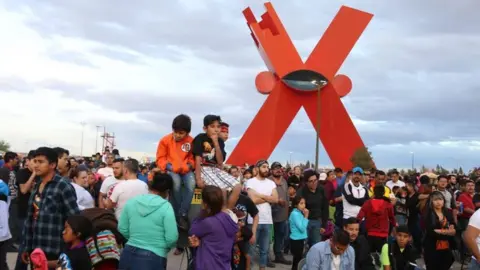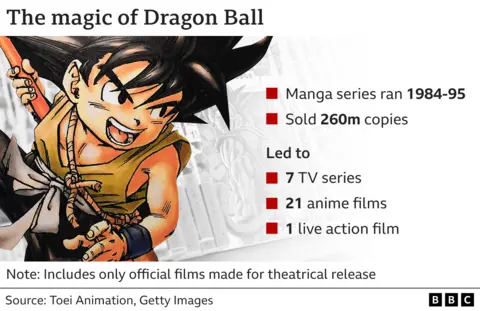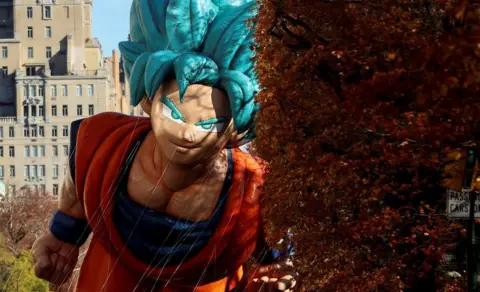How Dragon Ball caused a diplomatic spat
 Ciudad Juarez/X
Ciudad Juarez/XThe death of Dragon Ball creator Akira Toriyama has been mourned by fans of the comic book and animated series.
But amid the tributes, fans have also been recalling how the series sparked a diplomatic incident between Japan and Mexico almost exactly six years ago.
Plans for public screenings in various Mexican cities ran into copyright snarl-ups and the Japanese Embassy was forced to step in.
But one event was salvaged after the studio struck a deal with officials.
It was 2018, and the first season of the anime series Dragon Ball Super was coming to a close after more than 100 episodes.
Various cities across Latin America were organising viewing parties for the last couple of episodes.
In Mexico's Ciudad Juarez, in the state of Chihuahua, a group of young people sought the local municipality's support to organised a free, public screening in one of the city's squares. Hundreds of people were expected to attend.
But as news of the public events spread, Dragon Ball's studios Toei Animation published a chilling statement: "Toei Animation has not authorised these public showings and does not support or sponsor any of these events, nor do we or any of our titles endorse any institution exhibiting the unauthorised episode."
The statement read further: "In an effort to support copyright laws, to protect the work of thousands of persons and many labour sectors, we request that you please enjoy our titles at the official platforms and broadcasters and not support illegal screenings that incite piracy."
Then a letter from the Japanese Embassy in Mexico, dated 16 March 2018, to the governor of the state of Coahuila that was widely circulated online echoed the concerns expressed by Toei Animation and requested the cancellation of any illegal screening.

But for Dragon Ball fans in Juarez, there was a happy ending. Mayor Armando Cabada successfully negotiated with the studios to allow the screening of the second-to-last episode of the series.
An estimated 15,000 people gathered in the city's Plaza de la Mexicanidad on 17 March 2018 and enjoyed Toriyama's creation.
The outpouring of love for the series on that day was also on show on Friday, after Toriyama's studio announced his death at the age of 68.
People from Sheffield to Chicago got in contact with the BBC to share what Dragon Ball meant to them growing up.
"This anime was absolutely my childhood, and influenced me to get past my struggles and become a better person, and it directly inspired me to improve in life, it's so incredibly sad to hear about his death but, his work will live on forever," said Amin Ibrahim.
And he was far from the only one. Northern Ireland-based Alexander Scullion said: "From a young age, I was heavily bullied, I felt very low at times. I started watching Dragon Ball and I was instantly entranced. I fell in love with the art, the story and the action."
 Reuters
ReutersSamantha Hauton in Wales shared a similar experience. She was a fan of Dragon Ball Z, one of the anime series that spawned from the manga: "I got through some lonely years in primary and secondary school thanks to Dragon Ball Z."
For some readers, Dragon Ball continued to be a part of their adult lives. Joshua Aistrop, from Sheffield, recalls: "Fond memories include watching Dragon Ball Super: Broly in cinemas and actively participating in organising and being a panellist at Saiyacon, the UK's inaugural Dragon Ball convention."
The global phenomenon, which made its debut in 1984, is inspired by the 16th Century Chinese novel Journey to the West, about a monk who goes on a pilgrimage to obtain sacred texts.
In Dragon Ball, a boy called Son Goku goes on a journey to find seven magical spheres which, when gathered, awake a dragon that grants wishes.
But Goku is not the only one seeking the dragon balls, and his many struggles and battles provide an opportunity for him to make friends, enemies, and mature.
